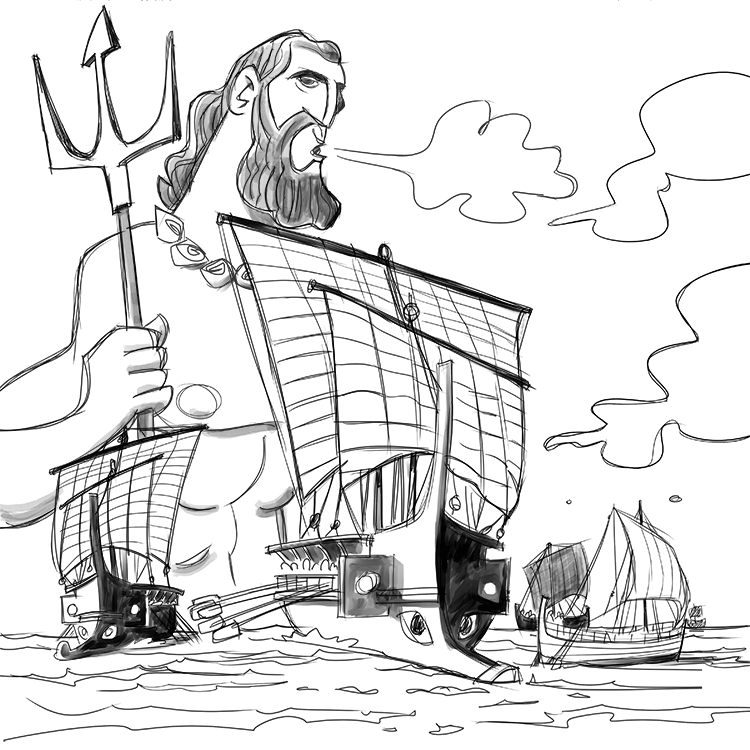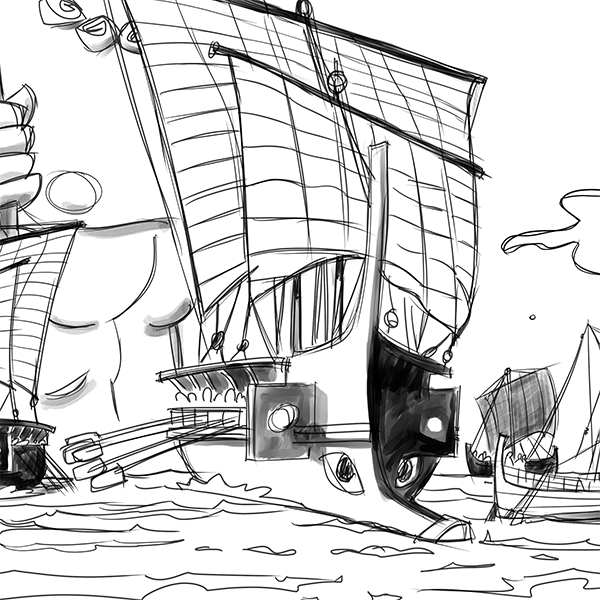If you’ve ever wondered how important trade is to human society, just wander down to a nearby store and check where things were made. You’ll find goods produced all around the world that have been shipped to you and put up for sale.
But trade today is merely an expansion of what has existed since the beginning of humanity. No civilization can completely provide for its population all on its own, and so it must work with others to meet these needs. When this happens, not only do people get richer, but they begin to mix cultures.
In ancient Greece, trade was vital to life. In addition to providing the Greeks with much-needed resources, it also allowed them to prosper and secure their place in history as one of the most influential ancient cultures of all time.

An Early Necessity Turns into a Valuable Skill
Part of the reason trade was so important in ancient Greece was because most of Greece has terrible farm land. For those who haven’t been to Greece, the landscape is dominated by mountains, and the soil is rocky and sparse in nutrients.
Therefore, from the initial days of civilization in Greece, which dates back to c. 2000 BC and beyond, trade was essential for life. The Greeks traded what they could grow (mainly grapes for wine and olives) and what they could find (gold, silver, and other metals) to other civilizations in exchange for wheat, barley, and other staples.
Over time, as Greek civilization grew, this need became even more pressing. For example, Athens, which was one of the largest and most influential city-states of the Classical Era (c. 600- c. 200 BC) grew very little of its own food. Instead, most of it was imported, either from foreign lands or other Greek city-states located throughout the Aegean.
This early dependence on trade helped make the Greeks really good sailors. Take one look at a map of Ancient Greece and one of the first things you’ll say is “Wow, that’s a lot of islands.”
Yes, Greek civilization was spread out across the sea, making it a necessity for them to develop a strong maritime tradition.
As time would go on, this would come in handy, particularly for the Athenians, who would go on to use their navy to establish the first empire of ancient Greece.
Spreading Greek Influence
In the early days of Greek civilization, cities could get what they needed by trading with other Greeks in the area. But as time went on and populations grew, it became necessary for the Greeks to branch out and explore.
One way they did this was by making contact with the other civilizations in the area. For example, Greece and Egypt were big time trade partners, with abundant Egypt supplying lots and lots of grain to its northern neighbors. Trade also put the Greeks into contact with the Persians, which didn’t end up going so well since the two fought a brutal war between 499 BC and c. 450 BC.
However, the Greeks didn’t just rely on other civilizations, they went out and got things done themselves. They did this mainly by establishing colonies throughout the ancient world.
One reason for setting up these settlements was to try and keep population growth in the main Greek cities under control. But another reason was to harvest and mine resources and send them back to mainland Greece.
Doing this through colonies was much easier since you didn’t (usually) have to worry about a war or some other conflict disrupting trade. However, the Greeks fought each other often, and the Peloponnesian War (fought between Athens and Sparta) basically started because of a disagreement related to a colony. So this wasn’t always a perfect strategy.
But it did help the cities of mainland Greece meet their needs, and it also helped spread Greek influence around the ancient world. Greek colonies could be found in parts of North Africa, modern-day Italy, France, and Spain, as well as through western Asia (modern-day Turkey, Iraq, Israel, Jordan, etc.)
In this sense, trade did much more for the Greeks than bring in resources. It connected them to the rest of the world, allowing them to expand their influence and alter the course of history.

Minting and Using Coins
To facilitate all of this trade, the Greeks needed some form of money. But just like the Greeks couldn’t agree on so many other things (such as which gods to worship, who should be in charge, who should fight the Persians, and so on and so on), they also couldn’t agree on a common coin.
Instead, three different standards emerged: one from Athens, known as the Attic standard, one from Corinth, known as the Corinthian standard, and one from Aegina, a city in the Northern Aegean Sea known as Aeginetan standard. This last coin was traded amongst the many Greek cities in the Aegean Sea and along the coast of what is now modern-day Turkey.
Together, these three coins were the three most common found in ancient Greece, and they were also the ones most recognized by Greek merchants and traders.
Only the most powerful and influential of city-states could mint coins, and doing so was a move to showcase your dominance.
Interestingly, Sparta, the next most significant city behind Athens, did not mint coins. But Sparta wasn’t all that interested in trade. They had access to the little bit of quality farmland that existed in Greece at the time and were much more focused on building their military. For them, this worked quite well. They were the only Greek city-state to rise to dominate the Greek world without minting its own coins.
A Weakness Exposed
While trade and commerce were critical to survival, this very fact also left the Greek world rather vulnerable. Athens in particular was always at risk of having its food supply cut off ─ a major problem when you can’t grow your own crops.
For most of Ancient Greek history, the Athenians got around this weakness by using diplomacy and building alliances. But when they picked a fight with Sparta and the Peloponnesian War began, this strategy did not work. It took them 30 years, but the Spartans eventually figured out that if they cut off Athens from its trade partners, the city would starve and be forced to surrender.
Sure enough, once Spartan forces won a few key victories in the Aegean, the Athenians had no choice but to admit defeat. In this case, being so dependent on trade ultimately contributed to the city’s demise.

Securing Greece’s Place in History
There is no doubt that the Ancient Greeks have had a tremendous influence on the world we now live in. Between math, philosophy, art, and architecture, the contributions are endless. But without trade, and the diplomatic connections it produced, it’s hard to imagine the Greeks influencing anyone but themselves.
But thanks to their need to expand beyond Greece, their ideas and customs spread, and human civilization has never been the same since.
Written by Matthew Jones
Illustrated by Pablo Velarde Diaz-Pache
